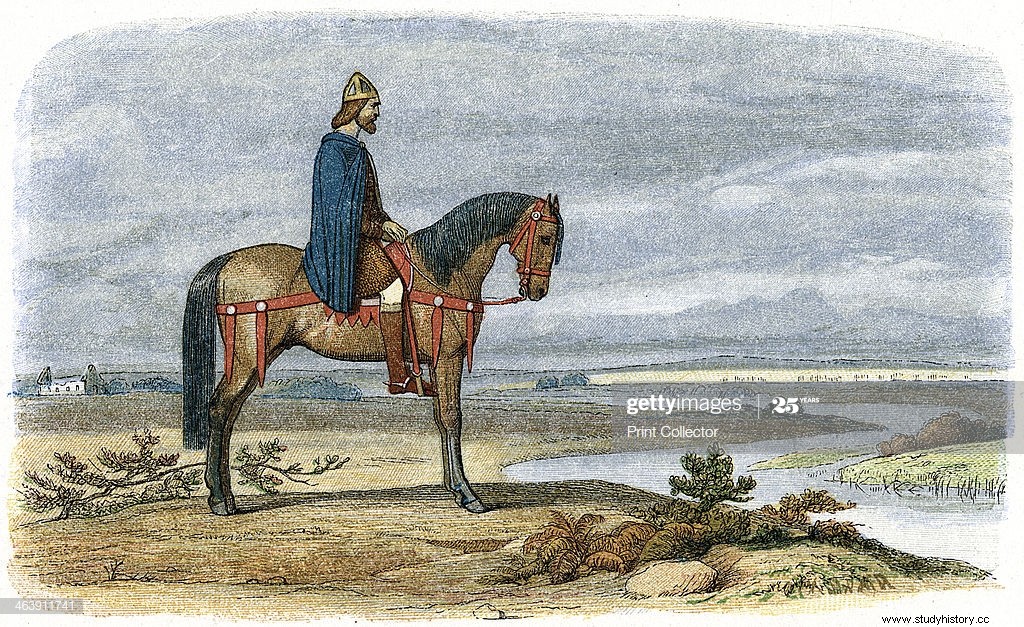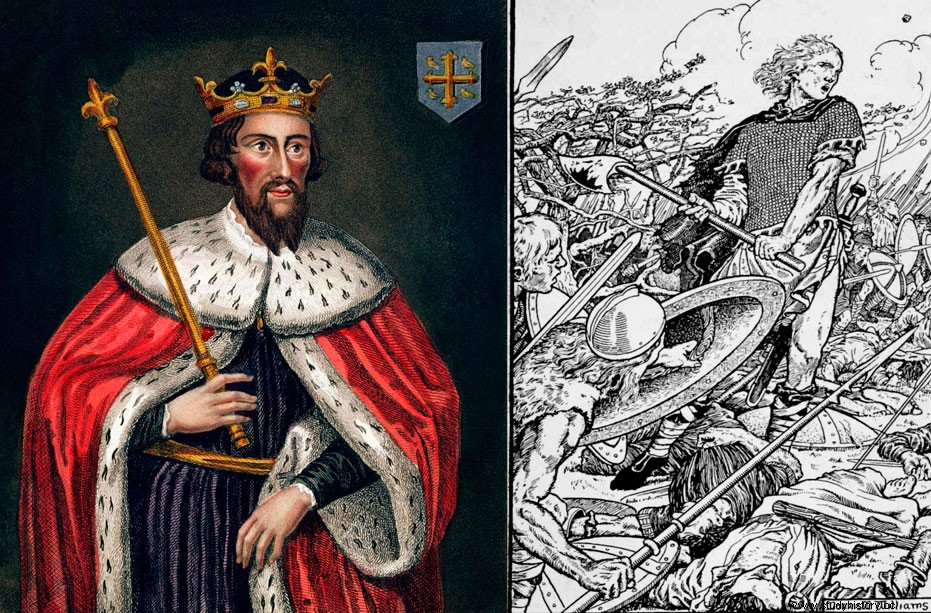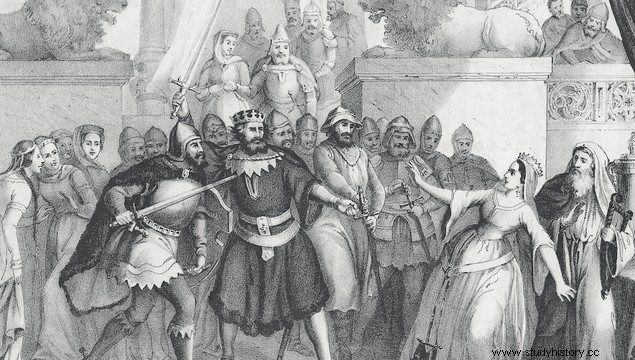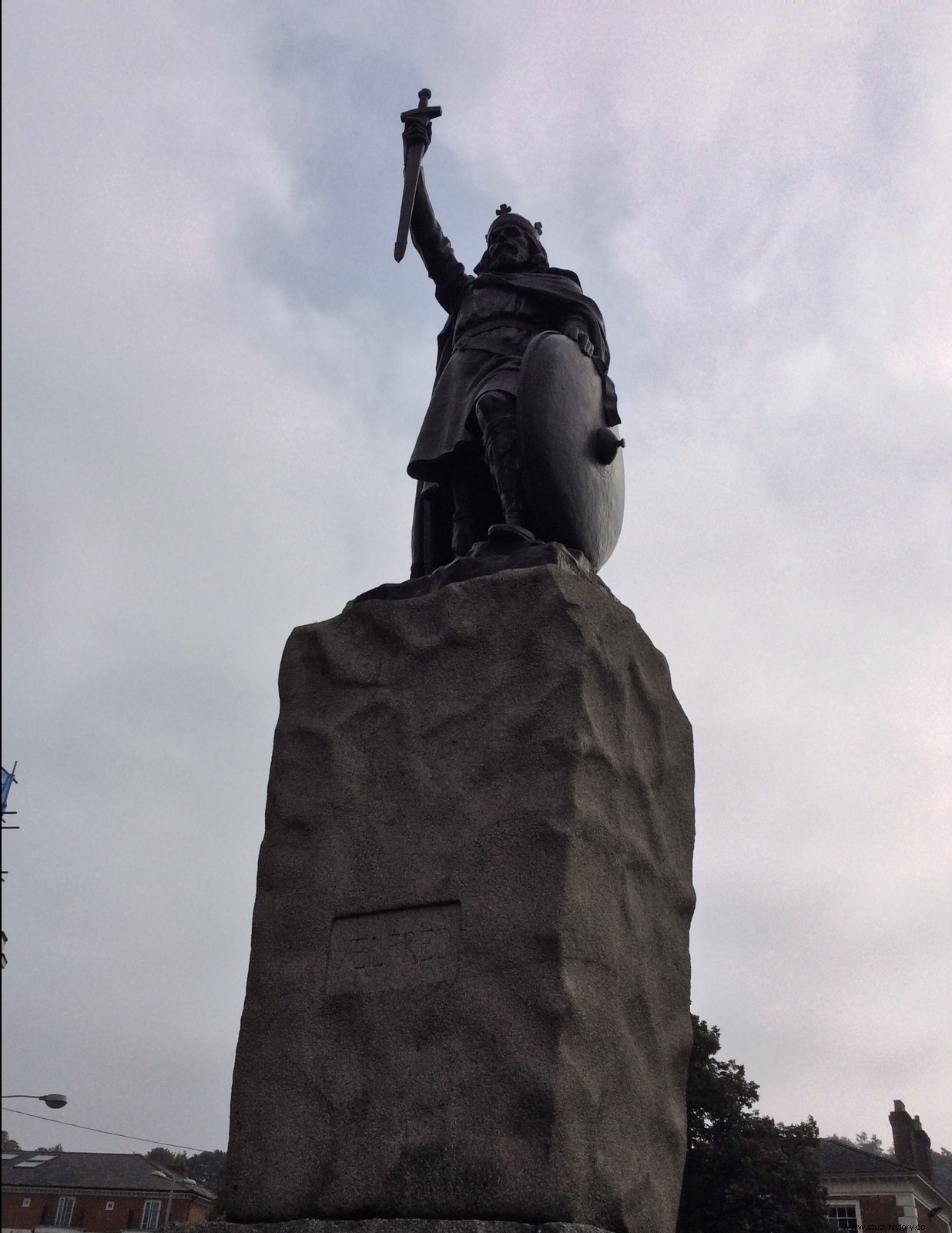As is recounted in detail in the blog entry dedicated to the Saxons and the Danes, at the end of the 8th century and for much of the 9th century, England was attacked by Vikings from Denmark and Norway. What started as quick raids for the purpose of robbery and pillage gradually turned into a full-blown invasion for the purpose of conquest and settlement.
Alfred, as we saw at the end of the post linked above, had been elected king of Wessex by the witan , but the kingdom of him was reducing its size as a result of the push and the Danish conquests. After a series of defeats, Alfred was forced to pay a large sum to prevent his kingdom from being conquered as Northumbria and East Anglia. He became a tributary king of the Danes and was even referred to by the monks of Abindgdon as "Judas" for seizing his wealth to pay the Danes. In compliance with what was agreed in the year 872, the Vikings left Wessex and traveled to London, where the Mercians paid them a large sum to keep the peace, that is, to leave the city.

In the year 872 in Northumbria there was a rebellion anti-Danish in the kingdom. As a result, the Danish puppet king Ecgberth had to go into exile and an independent Saxon domain was established in the north of the kingdom, based in Bamburgh, led by a king named Ricsige. The Danes counterattacked, but finally they rejected to continue fighting to take over the northern part of the kingdom, inhospitable, without waterways and without natural wealth. It would remain independent until the 10th century. The Danes, for their part, established their base for rule of southern Northumbria at Torksey, northwest of Lincoln.
The situation did not last long. If the north of Northumbria was not a very attractive target for the Danes, the same was not the case with the rich and militarily accessible kingdom of Mercia. In the year 873 the Danes attacked Repton and took control of Mercia, expelling King Burgred that he had to leave the kingdom (he died in exile in Rome). The Danes divided their domain into a western part where they placed the local Ceowulf II as king, reserving the government directly for the eastern part of the kingdom. The Wessex chronicles describe Ceowulf as a puppet king, although some other sources disagree and even point out that he collaborated with Alfred in some common project of both kingdoms.
From then on, the Danish army was divided into several contingents that followed their different leaders. As Halfdan moved to consolidate his hold on Northumbria, the force led by Guthrum and the other chieftains moved east. The Danes were firmly established on the island of Great Britain, where they farmed, worked, fought, bred, died, and were buried with all their pagan ritual. The names of the towns reflect what were no longer raiding expeditions, but full-fledged colonization.
Although in 875 the Wessex fleet managed to defeat the Vikings in a skirmish, the following year a Danish army led by Oscetel and Anwend entered Wessex and occupied Warenham. The peace talks and the exchange of hostages were of no avail. After executing the Saxon captives, the Danes continued their advance and occupied Exeter. After a Viking fleet heading there to support them fell victim to a major storm and the Saxons were once again unable to successfully besiege the city, new agreements were made to unblock the situation and hostages were once again exchanged.

In January 878 the Danes invaded Wessex again and, led by Guthrum, they took Chippenham, where Alfred's residence was located. It is not known whether he was there or not, but after the attack he was forced to take refuge with a small group of loyalists in the Somerset marshes while the Danes roamed throughout Wessex.
And from there began the story that led Alfredo to be known as the Great. He built a fortress at Athelney (Somerset) and began recruiting men for his army. There news reached him that must have raised the spirits of his retinue. A Saxon army led by the Saxon Earl Odda had won a resounding victory at Cynwit over a Danish force. The leader of the Vikings, Ubbe (brother of Ivar and one of King Edmund's executioners), perished in the battle.
When Alfred was ready he assembled the Saxon forces at Egbert's Stone, a particularly symbolic place for the Saxons (it was named after Alfred's grandfather, Ecgberth, victor over the Vikings and forger of the domain of Wessex among the Saxon kingdoms) and prepared to face the Danes. The battle was held at Edington in May 878, and Alfred defeated the invaders; he afterwards pursued them to the fortress at Chippenham and besieged them until the Norsemen surrendered the place.
Alfred's forces had surprised the Danes with this move, but they were clearly insufficient for a long campaign to retake all the ground conquered from the Danes. It was time to sign peace with the Danish king Guthrum, who converted to Christianity adopting the name Athelstan (Alfredo was his godfather). The Danes left Wessex and settled in East Anglia, where Guthrum was proclaimed king. Later it was agreed to set the border between the Danish kingdom of Guthrum and the Anglo-Saxon kingdom of Alfredo, who not only recovered the territory of Wessex but also incorporated into his kingdom areas that previously did not belong to it but to Mercia.
 In all probability, Alfredo also had to give Guthrum a more than generous amount of money to gain access to the agreement. However, from the Saxon point of view, the acceptance of this gift, coupled with the choice of the symbolic name Athelstan and Alfred's sponsorship of Guthrum's baptism, made Guthrum and his kingdom subjects of the King of Wessex, who he would hold a position of supremacy as sovereign lord of the kingdom of East Anglia.
In all probability, Alfredo also had to give Guthrum a more than generous amount of money to gain access to the agreement. However, from the Saxon point of view, the acceptance of this gift, coupled with the choice of the symbolic name Athelstan and Alfred's sponsorship of Guthrum's baptism, made Guthrum and his kingdom subjects of the King of Wessex, who he would hold a position of supremacy as sovereign lord of the kingdom of East Anglia.
Whether Guthrum and the Danes understood it this way too is another question. For the Dane, the decision was probably more practical than anything else:if he was going to rule a kingdom populated mostly by Christian Saxons, it was convenient that he at least formally appear to be both, and for this it helped to be baptized and adopt a Saxon name.
In any case, the agreement between Alfredo and Guthrum/Athelstan worked for a while. In the year 879 a fleet from Denmark sailed up the Thames to London, where it remained for a few months. The Saxons feared that Guthrum's army would join them, but it did not. Ultimately, the invading fleet left Britain for France and the Netherlands.
Around 880 the Mercian king Ceolwulf died, possibly fighting in Wales. As there is no clear descent in the royal family, Ceolwulf is considered to be the last king of Mercia. Thereafter rulers were elected who called themselves kings, although Wessex documents refer to them simply as earls or as lords of the Mercians, to make it clear that their lands were now part of Wessex and that any authority they held was by delegation from the King of Wessex.
Finally, a Mercian nobleman named Aethelred, who did not call himself rex, came to power. , but as dux . There is no record of where he came from or how he came to dominate Mercia. In the year 883 Aethelred swore allegiance to Alfred. In 886 a combined Wessex and Mercian force occupied London. Alfred subsequently delegated his authority over the city to Aethelred. London had traditionally belonged to the kingdom of Mercia, but Alfred's deputy to Aethelred seems to show that it had by then fallen under Wessex rule. Alfred also granted Aethelred the hand of his daughter Aethelflaed.
 As a consequence of the Danish conquests in the rest of the Saxon kingdoms and the partition agreement reached with Alfred over Wessex, Norsemen dominated a large region of England known as Danelaw . This territory comprised most of the north and east of England, with a colony of Norwegians in the northwest. This did not mean that there was a single Danish kingdom in England, as the Danelaw was not a politically defined and unified territory. In fact, the term Danelaw was not used until the 11th century. Except in the case of Guthrum in East Anglia, in the rest of their territories the Danes did not proclaim a Scandinavian king.
As a consequence of the Danish conquests in the rest of the Saxon kingdoms and the partition agreement reached with Alfred over Wessex, Norsemen dominated a large region of England known as Danelaw . This territory comprised most of the north and east of England, with a colony of Norwegians in the northwest. This did not mean that there was a single Danish kingdom in England, as the Danelaw was not a politically defined and unified territory. In fact, the term Danelaw was not used until the 11th century. Except in the case of Guthrum in East Anglia, in the rest of their territories the Danes did not proclaim a Scandinavian king.
Successive waves of new settlers from Denmark arrived in this region, to whom the land still available was awarded, although the best land was already occupied by those who had preceded them on arrival in England. Fortified towns were established for the Scandinavian settlers protected by the Danish army, the most important of which were Nottingham, Leicester, Derby, Stamford and Lincoln.
The presence of Danish settlers meant a flourishing of trade that translated into the prosperity of the areas of the Danelaw . In fact, the three most prosperous counties in England during the 11th century (Norfolk, Suffolk and Lincolnshire) were within the Danelaw.
For his part, Alfred took the pertinent measures to consolidate the situation of his kingdom against new incursions by establishing a chain of fortified cities that guaranteed that none of his subjects would be found. more than 30 kilometers from a place to take refuge. Many of these cities were located on ancient settlements from the Bronze Age or Roman times. He also undertook the construction of a fleet of ships to defend his coasts from the feared Scandinavian ships. He completed the military preparation of his kingdom with the establishment of a communication system through watchtowers that would allow the alarm to be raised quickly in the event of an attack.
Soon this system devised by Alfredo was going to be put to the test. In the year 896 a force of about 4,000 warriors from Denmark invaded Kent from the east, led by a chieftain named Haesten. Their families traveled with them, which made it clear that his intention was to settle in the area. Although Alfred managed to drive them back, he was suddenly faced with a chain of coordinated Danelaw Norse attacks on the western part of his domain. These attacks on Benfleet, Hampshire and Berkshire were intended to focus the Saxons on repelling this threat in western Wessex so that the newcomers could settle in the eastern kingdom.
But the Danes underestimated Alfred and the military preparation of his army. In the following months the Wessex was not only able to defeat the invaders who had penetrated from the west, but also managed to send reinforcements to the eastern part of the kingdom under the command of his son Edward and Aethelred of Mercia, who were accompanied by a Welsh contingent, so that finally the Scandinavians from the Danelaw they desisted from their attacks in the west, while the new wave from Denmark left Kent and ended up settling in the domains of their compatriots in East Anglia and Northumbria.

Alfred also compiled the laws of the kingdom and he ordered and participated in the translation into the language of the country of numerous texts in Latin, both of general culture and religious. He was a very pious man. As a child he had traveled to Rome and established a Christian kingdom surrounded by pagan domains. He cemented alliances with other kingdoms by marrying his daughters to the king of neighboring Mercia and
with the Count of Flanders, whose naval power was very important in case of future conflicts with the Danes.
All this was aimed at consolidating the idea of Alfred and Wessex not as one more of the Saxon kingdoms on the island, but as THE kingdom, the only Saxon domain over all of England dane free. While his predecessors were called rex Westsaxonum or rex Occindentalium Saxonum , from about 880 documents produced at Alfred's court increasingly referred to him as rex Anglorum et Saxonum or as Aelfred Angul-Saxorum rex. In the Anglo-Saxon Chronicle Alfredo's entry into London in the year 886 is thus recounted:"and in him all the English who did not live under Danish slavery placed their hopes." It can be said that the Viking invasions and the agreements signed between Alfredo and Guthrum laid the foundations of a unified Anglo-Saxon England.
The main source of narration of the events that occurred in Anglo-Saxon England is the one known as AngloSaxon Chronicle , a series of annals that recount what happened on the island from the withdrawal of the Roman army in the fourth century to the Norman invasion in 1066. Its drafting began in the reign of Alfred the Great in the 880s and its Historical reliability is doubtful, especially with regard to Alfred's own reign, who was more concerned with the propaganda effects he was pursuing than with the truth of what was reported.
For this reason and for having stopped the Danish invasion and recovered more territory than was initially part of the kingdom of Wessex, he is considered by many to be the first English king and is known by the title from El Grande.
Alfred the Great died in the year 899. The Anglo-Saxon Chronicle dedicates the following obituary to him:«he reigned over all the English except the part under Danish control». It is a definition of Alfredo's authority that fits with the development of his reign, but that is a way of delimiting authority based more on ethnicity than on territory, a mutable and somewhat ethereal concept, as would be shown in the reigns that followed Alfred's.
The daughter of Alfred Aethelflaed, who married the ruler of Mercia, also has her own importance and a very interesting biography... but that's another story.
Fonts|
Thomas Williams. Viking Britain. An explanation.
Peter Ackroyd. The History of England. Volume I. Foundations.
Annie Whitehead. Mercia. The rise and fall of a Kingdom.
http://www.royal.gov.uk/HistoryoftheMonarchy/KingsandQueensofEngland/TheAnglo-Saxonkings/AlfredtheGreat.aspx
http://www.britannica.com/EBchecked/topic/14785/Alfred
Image| Wikimedia Commons, author archive, Getty Images.
